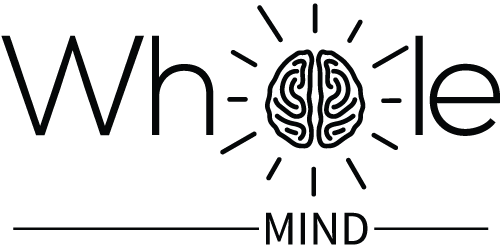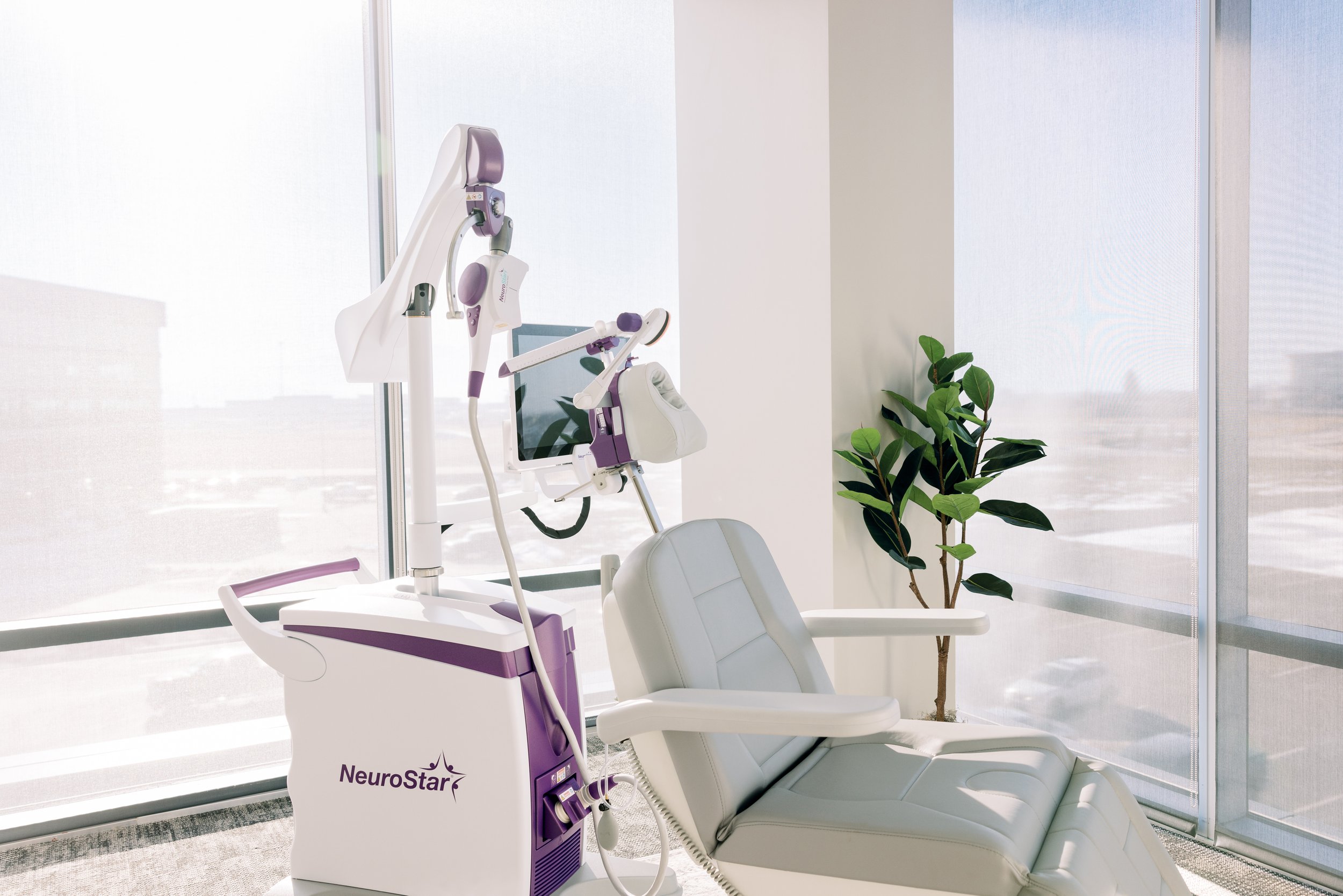About NeuroStar TMS Therapy
What is NeuroStar Advanced Therapy (TMS)?
Transcranial magnetic stimulation (TMS) is a treatment for depression for adults (21 years and above) that is effective when other treatments have failed. The exact cause of depression is not known, the leading scientific theory is that it’s caused by an imbalance of the brain’s neurotransmitters, which are chemical messengers that send signals between brain cells.
During a NeuroStar TMS therapy session, a magnet similar in strength to that used in a magnetic resonance imaging (MRI) machine is used to stimulate nerve cells in the area of the brain thought to control mood. These magnetic pulses may have a positive effect on the brain’s neurotransmitter levels, making long-term remission possible.
Treatment with NeuroStar Advanced Therapy is easy:
Therapy sessions are conducted in your NeuroStar doctor’s office
You remain awake during treatment, and able to return to normal activities
It’s covered by most health insurance plans, including Medicare and Tricare
NeuroStar TMS Therapy Benefits & Highlights
Non invasive and non systemic so side effects are only the possible minor irritation of scalp.
Non Invasive
19 - 37 minute
Each treatment typically lasts 19-37 minutes. Variations depends on you diagnosis.
A typical treatment course consists of 5 treatments per week over a 7 week period.
30-36 Treatments
You will be fully awake and alert. You can read or watch TV and return to work after with no restrictions.
After Treatment
Covered by Insurance
Non-drug
Proven to work
No side effects of drugs
Long Lasting Relief
FDA Cleared
How NeuroStar TMS Therapy Works
Here’s what you can expect from a NeuroStar Advanced Therapy (TMS) session:
You’ll recline comfortably in the treatment chair. A small, curved magnetic coil will be positioned lightly on your head.
Before Treatment
NeuroStar delivers focused magnetic stimulation directly to the target areas of the brain. You’ll hear a clicking sound and feel a tapping sensation on your head.
During Treatment
NeuroStar Advanced Therapy: Depending on your doctor’s recommendation, each treatment takes between 19 and 37 minutes.
You can resume normal activities immediately.
Because there are no effects on alertness you can drive yourself to and from treatment sessions.
In-office treatment with NeuroStar TMS Therapy typically takes 19-37 minutes and is administered 5 days a week for approximately 7 weeks.*
After Treatment
TMS Testimonials
TMS Clinical Trials & Academic Studies
Carpenter LL, et al. (2012). Transcranial Magnetic Stimulation (TMS) for Major Depression: A Multisite, Naturalistic, Observational Study of Acute Treatment Outcomes in Clinical Practice. Depression and Anxiety, 29(7):587-596. www.ncbi.nlm.nih.gov/pubmed/22689344
George MS, et al. (2010). Daily Left Prefrontal Transcranial Magnetic Stimulation Therapy for Major Depressive Disorder: A Sham-Controlled Randomized Trial. Arch Gen Psychiatry, 67(5):507-516. www.ncbi.nlm.nih.gov/pubmed/20439832
Dunner DL, et al. (2014). A Multisite, Naturalistic, Observational Study of Transcranial Magnetic Stimulation (TMS) for Patients with Pharmacoresistant Major Depressive Disorder: Durability of Benefit Over a 1-Year Follow-Up Period. J Clin Psychiatry. 75(12):1394-1401. www.ncbi.nlm.nih.gov/pubmed/25271871
O’Reardon JP, et al. (2007). Efficacy and Safety of Transcranial Magnetic Stimulation in the Acute Treatment of Major Depression: A Multisite Randomized Controlled Trial. Biol Psychiatry, 62(11):1208-1216. www.ncbi.nlm.nih.gov/pubmed/17573044
Frequently Asked Questions
-
Transcranial magnetic stimulation, often referred to as TMS is a noninvasive procedure that uses magnetic fields to stimulate nerve cells in the brain to improve symptoms of depression. TMS is typically used when antidepressant medications haven’t been effective, have ceased working, or as an alternative to medication.
-
TMS involves delivering magnetic pulses to specific parts of the brain.
-
In a study of “real-world” outcomes (meaning actual NeuroStar patients), 83% of people who completed the full NeuroStar treatment cycle experienced a measurable decrease in the severity of their depression, and 62% of those completing treatment saw full remission – meaning their depression effectively “went away.”
Sackeim HA, et al. (2020) J. Affect. Disord. 277:65-74. Based on a real-world, retrospective study using CGI-S and a sample size of 615 patients. -
No, TMS treatment is typically not painful. Most individuals describe it as a tapping or knocking sensation on the scalp beneath the treatment coil.
-
A typical initial course of treatment is about 19-37 minutes daily over 7 weeks.
-
A vast majority of commercial and Medicare plans have recognized the effectiveness of treating depression with TMS Therapy and now cover TMS as part of their plans.
-
TMS does not circulate in the blood throughout the body, so it does not have side effects like weight gain, sexual dysfunction, nausea, dry mouth, sedation, etc. The most common side effects reported during clinical trials were headache and scalp discomfort —generally mild to moderate—occurring less frequently after the first week of treatment.
-
No. TMS Therapy involves a unique method of using pulsed magnetic fields for a therapeutic benefit. The intensity of the magnetic field is similar to that of an MRI. These techniques differ radically from the popular use of low intensity, static magnetic fields. Those products deliver weak and undirected static fields that are not capable of activating brain cells. The activation and stimulation of brain cells is a key part of why TMS is so effective.
The NeuroStar Advanced Therapy System is indicated for the treatment of depressive episodes and for decreasing anxiety symptoms for those who may exhibit comorbid anxiety symptoms in adult patients suffering from Major Depressive Disorder (MDD) and who failed to achieve satisfactory improvement from previous antidepressant medication treatment in the current episode. The NeuroStar Advanced Therapy system is intended to be used as an adjunct for the treatment of adult patients suffering from Obsessive-Compulsive Disorder (OCD). NeuroStar Advanced Therapy is only available by prescription. A doctor can help decide if NeuroStar Advanced Therapy is right for you. Patients’ results may vary.
Important Safety Information
The most common side effect is pain or discomfort at or near the treatment site. These events are transient; they occur during the TMS treatment course and do not occur for most patients after the first week of treatment. There is a rare risk of seizure associated with the use of TMS therapy (<0.1% per patient). NeuroStar Advanced Therapy should not be used with patients who have non-removable conductive metal in or near the head. NeuroStar Advanced Therapy has not been studied in patients who have not received prior antidepressant treatment.
Visit neurostar.com for full safety and prescribing information.







